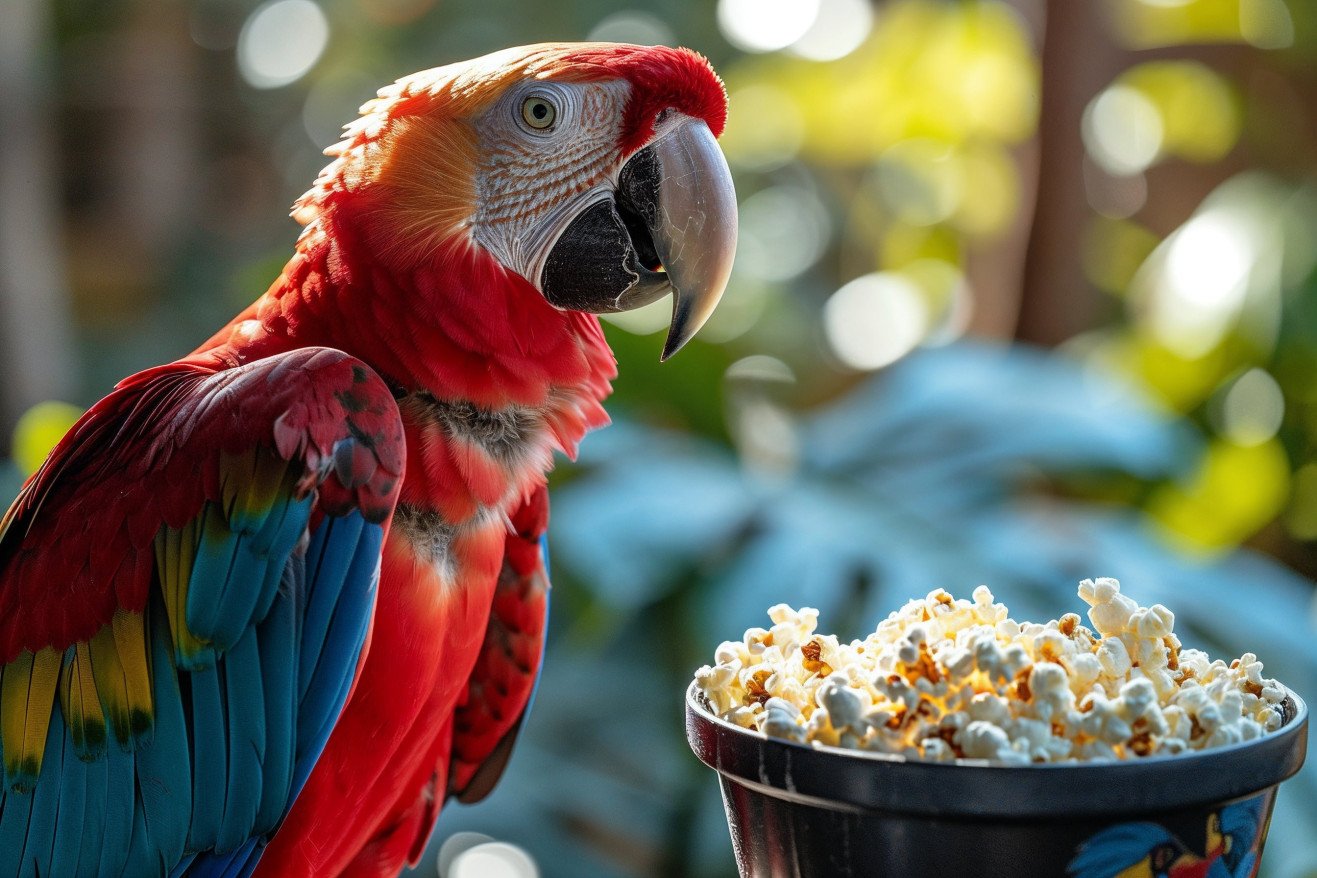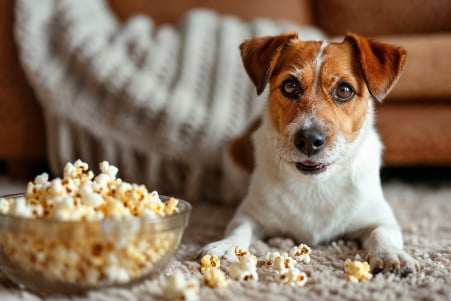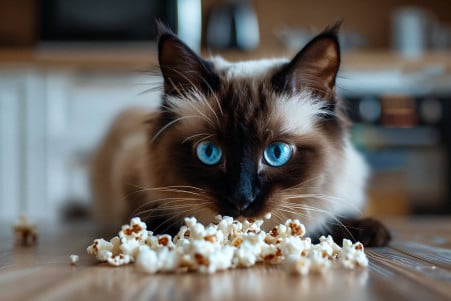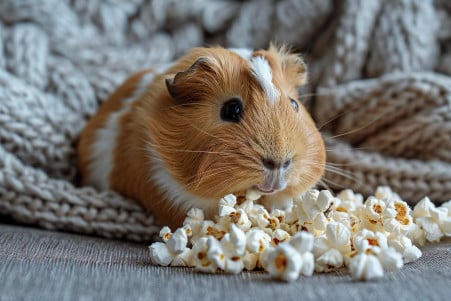Can Birds Have Popcorn? A Nutritional Analysis of Healthy Bird Snacks
5 February 2024

Popcorn is a classic snack for humans, but can it also be a healthy snack for birds? While it should only be given in moderation, birds can eat popcorn. However, it should be unsalted and unbuttered and, for small birds, it’s best to make sure that any unpopped kernels are soaked to avoid choking.
That said, popcorn should never be a replacement for the seeds and fruits that should make up the bulk of a bird’s diet.
This article will look at the impact of popcorn on birds by reviewing the latest research in ornithological nutrition and avian dietary studies. It will also look at how popcorn’s nutritional content lines up with the needs of birds. Finally, it will look at the potential risks and benefits and offer tips on how to safely add popcorn to a bird’s diet. The hope is to give a well-rounded view of this interesting topic.
Can birds eat popcorn?
Popcorn’s Role in Bird Nutrition
Popcorn is a low-nutrient food for birds, providing mostly fiber, carbohydrates, and a small amount of protein. A guide to bird nutrition from Stanford University explains that birds’ nutritional needs are similar to those of humans, in that they need a balanced diet of proteins, fats, carbohydrates, vitamins, and minerals to be healthy.
While popcorn can provide birds with carbohydrates for energy and fiber to help with digestion, it doesn’t meet all of their nutritional needs.
The protein in popcorn is especially low and wouldn’t meet the increased protein needs that birds have during certain life stages, such as growth, molting, or breeding. During these times, even birds like sparrows that are mostly herbivorous will increase their intake of insects to get the higher-quality protein they need. In addition, popcorn doesn’t provide the vitamins and minerals that birds would get from a well-rounded diet that includes insects, fruit, and seeds.
Feeding birds too much popcorn can lead to nutritional deficiencies, so it’s important to feed it in moderation. Popcorn should be thought of as a special treat rather than a regular part of a bird’s diet because of the potential health problems that can come from overfeeding, including malnutrition and the feeling of being full that can lead to a bird eating less of its regular, more nutritious diet.
If you’re going to feed popcorn to birds, it should be plain and free of any seasonings or other additives that could be harmful to their health.
Additives in Popcorn and Their Effect on Bird Health
Popcorn can be a great treat for birds, but it’s important to watch out for common additives such as salt, butter, and flavorings, which can all be harmful. According to an article by Planet Pet, salt can cause electrolyte imbalances and dehydration in birds, and butter can lead to heart problems. Even small amounts of these additives can cause serious health problems in birds, including organ failure and death.
To ensure the safety of our avian friends, it’s best to stick with plain, air-popped popcorn. The Nature Blog Network recommends making your own air-popped popcorn to avoid the chemicals found in microwave popcorn.
By giving birds plain popcorn, you can also make sure that they’re not eating anything that they may be allergic or sensitive to, as the Nature Blog Network points out. It’s also important to remember that popcorn should be given in moderation and make up only a small part of a bird’s healthy diet.
How Birds Digest Popcorn
The avian digestive system is highly specialized to process a wide range of foods, including seeds, insects, and other items that are part of their natural diets. Birds don’t have teeth, so they use their beaks to pick up food and their gizzards to grind it up, with the help of stones that they’ve ingested.
According to The Digestive Anatomy and Physiology of Birds by Colorado State University, the process of digestion starts at the beak, goes through the esophagus, often into a crop for storage, and then into the stomach and intestines for absorption of nutrients.
In the case of grains like popcorn, the gizzard is responsible for grinding up the popped or unpopped kernels to make them digestible. However, birds may be less efficient at processing unpopped kernels because they are harder and therefore may pose a risk if they are not softened before being consumed.
The form of the popcorn may affect how easily birds can digest it. A study from All About Feed found that whole grains, like unpopped popcorn, can lead to an increase in gizzard weight, which suggests that the muscle of the gizzard has to work harder to process these harder items.
Therefore, it’s best to either soak unpopped popcorn before offering it to birds or to offer them popped popcorn, which is softer and easier to digest.
Popcorn should be fed to birds with caution. To avoid the risk of impaction, make sure that the popcorn you offer birds is easily digestible and always feed it in moderation, taking into account the bird’s overall nutritional needs, including the need for a diet that provides a balance of energy, protein, and other nutrients.
Responsible Bird Feeding: Adding Popcorn to Bird Diets
While adding popcorn to a bird’s diet can be a fun way to offer a little variety, it’s important to be responsible. The U.S. Fish & Wildlife Service notes that like with most things, the key to feeding birds popcorn is to do it in moderation.
Instead of making popcorn a regular part of a bird’s diet, it should be offered as an occasional treat. A good way to ensure that popcorn isn’t taking the place of healthier foods is to offer no more than a tablespoon of plain, air-popped popcorn per bird every few weeks.
The All About Birds feeding guide also suggests that popcorn should be offered in combination with other treats, like small pieces of fruit or unsalted nuts. This can help ensure that the treat is at least a little nutritious.
Meanwhile, an article in PMC on bird health notes that it’s important to keep feeders clean. This is especially important in light of the pandemic, which has led to more people feeding birds and therefore more concerns about disease.
By making sure to offer a variety of treats in moderation and to keep feeders clean, bird lovers can enjoy watching their feathered friends enjoy a special snack without putting their health at risk.
So Is Popcorn Good for Birds?
So, while popcorn can be a fun and tasty snack for many birds, it should be given with some caution. It’s been well-documented that plain, air-popped popcorn with no salt, butter, or other flavorings is the best choice for birds.
And, as Wild Bird Scoop points out and Birdfact agrees with, it’s important to give popcorn in moderation to avoid getting birds hooked on a low-nutrient snack and to keep them from consuming additives that could be harmful.
While popcorn does contain fiber and has low sugar content, it lacks the vitamins and proteins that birds need to be healthy. This article has shown that the key to feeding birds popcorn is to do so in moderation and with a sense of responsibility. Birds need a diet that includes a variety of natural seeds, fruits, and nuts that will give them the nutrients they need to be healthy.
As responsible birders, we should encourage a natural diet for birds and only occasionally supplement it with treats like popcorn that meet their dietary needs. It’s important that we continue to learn about bird nutrition and that we’re responsible in our feeding habits, not just for our enjoyment of birdwatching but for the health of the birds we love.


